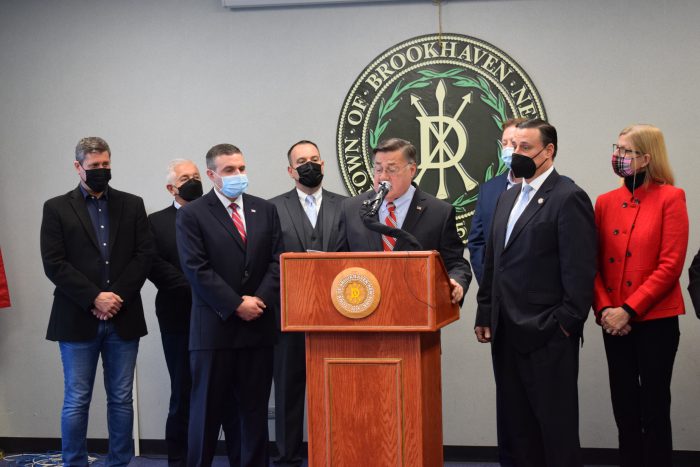Brookhaven officials slam Gov. Hochul’s accessory apartment proposal

Elected officials from local, state and the federal government recently voiced their anger and concern over Gov. Kathy Hochul’s (D) plans to eliminate certain single-family zoning laws across New York state.
The comprehensive five-year housing plan would potentially invest $25 billion to create and preserve 100,000 affordable homes and tackle inequities in the housing market.
Last month, the governor announced the plan to make housing more affordable as part of the 2022 State of the State.
“In the wake of the pandemic, it’s crucial that we tackle the housing crisis and make New York a more affordable place for all,” Hochul said. “These bold steps are a major step forward in transforming our housing market, protecting affordability and increasing the housing supply.”
But on Feb. 3, local representatives in the Town of Brookhaven held a press conference blasting a major component of the proposal — changing zoning laws to allow more accessory apartments on premises, effectively eliminating single-family zoning.
Officials argued that under this plan, “the state would take zoning control away from local governments, eliminating local residents’ ability to voice objections to these apartments in their neighborhoods.”
They added that the bill would prohibit imposing parking requirements for these new apartments, which they said would result in cars clogging residential streets.
“Under Governor Hochul’s plan, every town, village and county overnight would lose the important zoning protections that keep them from looking like the crowded neighborhoods of the Bronx, Queens and Brooklyn,” said town Supervisor Ed Romaine (R). “That’s not what the residents of Brookhaven Town want. This wrongheaded plan will not solve our affordable housing plan, but it will devalue the homes and quality of life in our neighborhoods.”
According to Hochul, legislation will be proposed to require municipalities to allow a minimum of one accessory dwelling unit, known as an ADU, on owner-occupied residentially zoned lots. This legislation will allow for municipalities to set size requirements and safety standards for these dwellings.
Currently the town allows accessory apartments on premises with specific regulations, including the owner of the lot upon which the accessory apartment is located must reside within the dwelling that contains the accessory apartment, and only one accessory apartment is permitted on the premises.
According to the town, the minimum habitable area for an accessory apartment shall be 300 square feet and a maximum of 650 square feet, and in no case should it exceed 40% of the habitable area of the dwelling building in which it is located. The law states that in no event may there be more than one bedroom per accessory apartment.
Brookhaven officials — in bipartisan agreement — said that the plan and change to the law would force apartments into every home, utilizing basements, garages, rear yard sheds and buildings.
Councilwoman Jane Bonner (R-Rocky Point) said that this proposal can have a significant impact on all of Long Island — not just the town.

“Yes, we do need affordable housing choices, but we don’t need a broad stroke across the state to change the very character of the communities that we live in,” she said. “We need to maintain local control, and this takes away that control. If the governor really wants to help Long Islanders, she should do something about the ridiculously high property taxes.”
Bruce Sander, president of Stony Brook Concerned Homeowners, said that he and his neighbors bought their homes in single-family neighborhoods “so we could raise our children and grow out in our family community.”
“The ability for unscrupulous landlords to not be accountable to the local officials is just plain outrageous and dangerous,” he added. “We have seen basement apartments with illegal occupants catch fire and create unsafe environments throughout the community. If we lose control, we lose our communities. What is being proposed could lead to the destruction of the suburbs.”
Councilmember Jonathan Kornreich (D-Stony Brook) said that while he “appreciates” that the governor is trying to address the question of affordability, taking away the power of local zoning can lead to “chaotic development that may in the end undermine the very fabric of our communities and property values we’re trying to protect.”
“Zoning helps maintain the character of neighborhoods,” he added. “Zoning also provides tools to address these questions of affordability, however, and I don’t want that power to be taken away.”
In attendance with the Town Board was state Sen. Anthony Palumbo (R-New Suffolk) who said this change in legislation could result in “greater density for communities and place tremendous strains on every conceivable local service from the water we drink, to traffic and emergency services.”
“This one size fits all approach is not the answer to Long Island nor the state’s affordable housing crisis,” he added.
While not in attendance during Thursday’s press event, local U.S. Reps. Lee Zeldin (R-NY1) and Tom Suozzi (D-NY3) both opposed Hochul’s plan.
“This blatant attack on suburban communities will end single-family housing as we know it, strip local control away from the New Yorkers who live there, tank the value of their homes, overcrowd their previously quiet streets, and on top of it all not do anything to solve our affordable housing problem,” said Zeldin, who is running on the Republican ticket for the governor’s seat.
Suozzi, who is also campaigning for governor, said, “Governor Hochul’s radical housing proposal would ‘require’ all municipalities to allow accessory dwelling units on all residential properties and would end single-family housing as we know it.”
Hochul outlined more of her plan during her State of the State address last month, with another reason being to help municipalities rezone to foster multifamily housing near commuter rail stations in the New York City suburbs, including Long Island.






